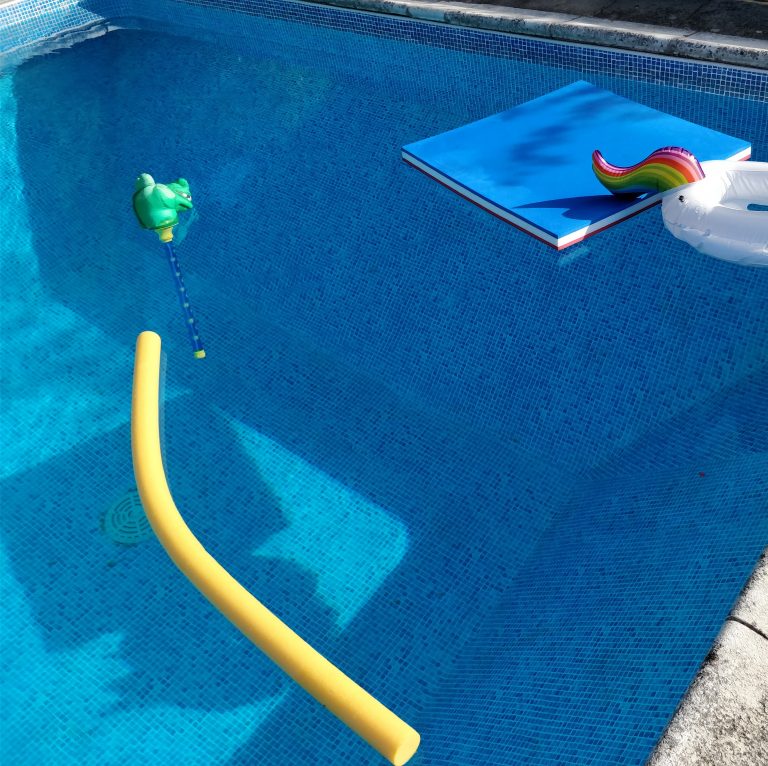
This blog is Part One of our two-part series discussing the best ways to keep your swimming pool clean!
Keeping a swimming pool clean is a necessary job for any pool owner. Leaves, twigs, branches and bugs all become detritus floating on the surface or sinking to the floor of a pool, while body oils, hair, cosmetics, soap, sunblock and other unseen contaminants brought in by swimmers can also pollute a pool. Yet the best way to keep a pool clean is really just to stay on top of it, as it really just involves doing several small jobs. Keeping your pool clean and fresh doesn’t take much work if the following are done regularly.
What is the Best Way to Keep a Pool Clean?
Keeping your pool spotless requires knowing a bit about science, and particularly chemistry. Along with a basic understanding of how chemicals interact, it’s important that pool owners regularly test the water, skim out detritus, backwash, shock, and conduct other minor tasks regularly. It also entails tools like swimming pool leaf nets, extra pool filter parts, in-built swimming pool skimmers, vacuums, and pool chemicals. Though most pools require chemicals, keeping a swimming pool clean doesn’t just entail having chemistry know-how. Keeping a swimming pool clean also calls for knowing biology, specifically limiting biological pathogens from invading the pool so that pollutants like algae, bacteria, and dead bugs don’t contaminate the water. Keeping your pool clean requires just a little work on a daily basis to balance water chemistry, while also keeping stuff out that shouldn’t be in the water.
Best Ways for Keeping Your Pool Clean
Though many people think keeping a swimming pool clean just entails occasional testing of and throwing chemicals into the water, it encompasses much more than that.
A Daily & Weekly Checklist
Perhaps the best way to keep your pool clean is to religiously follow and complete the following chores on a daily and weekly basis.
Conduct these duties daily:
- Run pool filter at least 12 hours daily.
- Check water level to make sure the skimmer can draw in surface water.
- Empty debris gathered in skimmer and pump baskets.
- Check filter pressure.
- Ensure the pool pump is operational.
- Test chlorine level to ensure it’s between 2-4 parts per million (ppm).
- Test pH level to ensure it falls between 7.4-7.6.
Do these at least once weekly:
- Backwash or clean filter when the pressure reaches 7-9 pounds per square inch (psi).
- Brush, skim, and vacuum pool.
- Dose water with algaecide, clarifier, and metal control.
- Keep the pool deck and surroundings clean.
- Replace chlorine tablets as needed.
- Test for alkalinity, ensuring it falls between 80-120 ppm.
- Shock water with calcium hypochlorite.
Prevent Algae
Keeping a swimming pool clean involves preventing algae growth, as dirty pools provide the perfect environment for algae. Preventing algae from growing is much easier than getting rid of it, however, so using algaecide regularly is probably the best way to keep a pool clean and free from it. Some advice on algae:
- Administer algaecide once weekly when the pool’s pH is balanced, or when signs of algae growth become visible.
- Keep chlorine at optimal levels.
- Shock pool water regularly.
- Watch for algae growth, especially on pool walls.
To eradicate algae, a pool may require shocking 2-3 times, and sometimes it’s necessary to drain and scrub the pool thoroughly a few times to keep it from spreading.
Test for Calcium Hardness
Water containing a lot of minerals can cause staining, so keeping a pool clean from these stains and mineral deposits caused by hard water entails keeping pH levels balanced, as high pH can cause calcium hardness. Too many minerals in the water can make it cloudy, which can be addressed through shocking or adding clarifiers to the water, along with other methods. Yet minerals in the water are not all bad, as too little calcium causes scaling and corrosion of pool equipment and walls, which can be remedied by adding a substance that increases calcium hardness.
Maintain Constant Circulation
Perhaps the easiest and best way to keep a pool clean comes through just maintaining constant water circulation. The pool’s pump needs to push water through the filter to strain out any detritus, so when the pump isn’t working, keeping a swimming pool clean gets much harder. Above-ground pools tend to have more issues with water circulation, as dead spots around steps, under skimmers, behind ladders and in any crevices can allow algae to flourish. Installing return jets that push in multiple directions can help, though you can circulate water manually with a pool brush instead.
Keep Your Filters Clean
Keeping the filter clean can also keep the water pump that works in tandem with it operational. Regularly clearing the debris that build-up at the filter is one of the easiest ways of keeping your pool clean. It’s additionally advisable to backwash swimming pools regularly, which simply involves pumping the water from the pool backward through the filter to wash out any gunk that builds up. Having spare pool filter parts on hand is also a good idea.
Halogen Supply has been a trusted resource in the commercial and residential pool and spa industry for over 80 years. To learn more about our pool products or inquire about a specific item, please request a quote from us at Halogen Supply today!
Stay tuned for Part 2 of this series about the best ways to keep your pool crystal clean!
